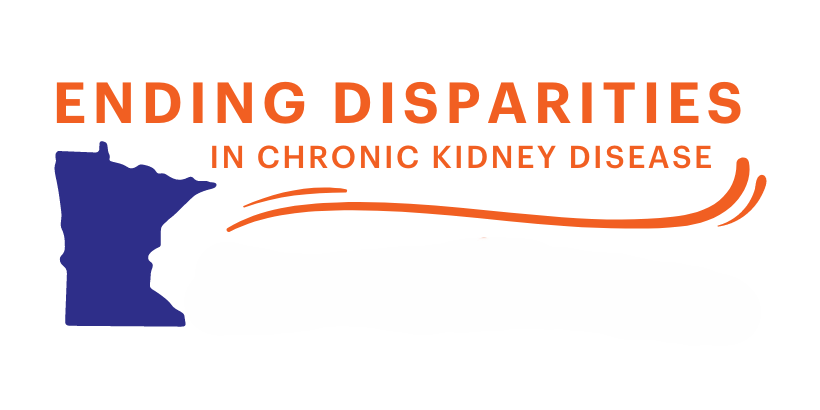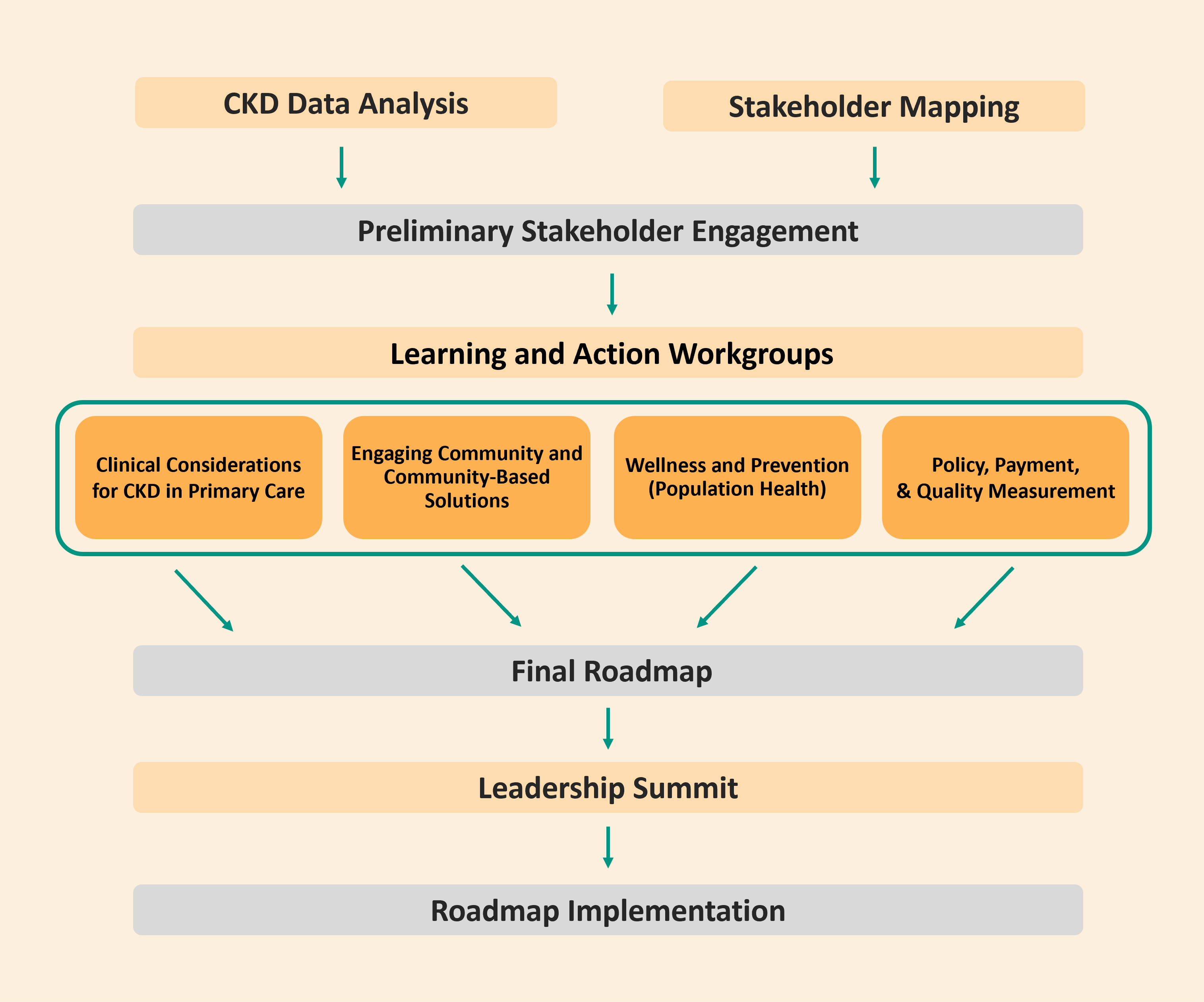About the Initiative

As part of a national NKF Collective Impact strategy, Minnesota stakeholders are implementing a roadmap to drive a cultural shift in primary care- toward increasing early diagnosis and appropriate management of CKD, particularly in communities disproportionately burdened by CKD.

Learning and Action Workgroups
Through a series of facilitated discussions, health care and public health leaders will identify barriers and solutions to improve CKD awareness, detection, and management in Minnesota as well as tools and strategies that can be implemented within stakeholders’ own institutions. Learning and Action Workgroups (LAWG) will support increased awareness and action amongst the participants. 4 workgroups will convene covering the following topics:
Clinical Considerations for CKD in Primary Care
- Goal: To discuss strategies and approaches that can be employed to improve CKD recognition and care in primary care settings
- Background: A large, national study illustrated that less than 12% of people with CKD were appropriately diagnosed in primary care.2 This included as many as 40% of people whose kidneys required specialty care. With the advent of new therapies demonstrated to slow or stop the progression of CKD, there is a very real opportunity to improve quality of care for people with CKD across the entire spectrum of disease.
Engaging Community and Community-Based Solutions
- Goal: To develop strategies to advance CKD awareness through community engagement and to ensure that health care providers are aware of the community resources available to prevent and delay CKD progression
- Background: In the US today, only 10% of people with laboratory evidence of CKD know that they have kidney disease.3 Improved patient awareness, engagement, and self-management are vital to successfully slowing CKD progression. As diabetes and hypertension play significant roles in the development of CKD, working with community organizations that support people with chronic disease can be an important step toward raising public awareness of CKD among those at risk for CKD.
Wellness and Prevention (CKD Population Health)
- Goal: To develop a strategy to incorporate CKD testing and diagnosis into wellness and prevention practices within the employer/commercial health plans and the broader community.
- Background: To date, almost 90% of people living with CKD remain undiagnosed in the population, and the majority will not receive guideline recommended annual testing.5 This breakout session will discuss the strategies that can be developed and employed to ensure that CKD testing and diagnosis are included as part of the wellness and prevention services, including corporate programs, diabetes prevention activities, etc., that are available in the state.
Policy, Payment, and Quality Measurement
- Goal: To develop a strategy to streamline CKD testing in primary care from a policy and payment perspective
- Background: In July 2020, the NCQA released the Kidney Health Evaluation for Adults with Diabetes HEDIS measure (KED).4 This measure assesses the percentage of adults with diabetes who receive both tests for CKD during the course of a year. When tested against over 70 claims datasets, this measure was achieved in only 35% of cases. This measure began public reporting in late 2023. In addition, effective in 2023, CMS made the KED measure a Medicare Merit-based Incentive Payment System (MIPS) measure, and NCQA launched an updated Diabetes Recognition Program to include the measure. For 2024, Medicare Advantage and Part D plans will report against the Kidney Health Evaluation Measure for the STAR ratings system.
Roadmap
After 16 hours of facilitated discussion, 63 stakeholders across 38 unique organizations identified 12 strategies to improve testing, diagnosis, and early management of CKD in Minnesota. Read the roadmap summary here.
Leadership Summit
On July 24, 2024, NKF, in partnership with the Minnesota Department of Health, hosted a virtual summit to present the recommendations and engage partners in joining the Collective Impact Approach. Over 230 key healthcare and public health stakeholders registered, and 148 attendees participated in this convening. Of the 12 recommendations presented at this event, 67 individuals made commitments to advance one or more recommendations of the roadmap at varying levels of support.
Minnesota Ending Disparities in CKD Leadership Summit Recording
We need ALL OF YOU to advance the recommendations discussed at the Summit. Take the survey and commit today!
Recommendation Implementation Status
Expand CKD Public Awareness and Education
NKF has actively raised CKD awareness through presentations at local prominent conferences, including the Minnesota Community Measurement conference, Align Summit, and Many Faces of Community Health conference. These collaborative presentations have explained the approaches used to develop the Collective Impact roadmap and actionable insights into deploying innovative solutions to enhance kidney health within diverse organizational settings. In the fall, NKF participated in 7 events for patients, professionals, and the broader community, including representation at the Minnesota State Fair/Kare 11 Health Fair. NKF also conducted a KEEP Healthy screening for the Latino community at Fiesta Latina in St. Paul and organized two impactful patient events: Donate Life Day with the Minnesota Twins and Kidney Kids Day in partnership with Minnesota United FC. If you’d like to share kidney health information at an upcoming community event, please contact Julie.
Educate and Activate Clinicians
CKD Data Assessment
To prevent Type 2 diabetes complications through early detection, MDH has partnered with the NKF to address screening inequities of CKD and diabetic retinopathy. Through data analysis and development of system change strategies, MDH is working to increase screening, awareness, and prevention of Type 2 diabetes. NKF’s comprehensive data assessment aims to shed light on opportunities to enhance the quality of CKD care. With MDH funding provided by the CDC 2320 grant, Hennepin Healthcare, Olmsted Medical Center, and Southside have analyzed their data to identify key areas for improvement to advance kidney health outcomes.
Clinician Education and Engagement
NKF has partnered with Hennepin Healthcare, NorthPoint Health & Wellness Center, and Olmsted Medical Center, to provide educational resources and presentations to their clinicians. Discussions have covered the CKD public health implications, best practices in screening and diagnosis, guideline directed medical therapy, and co-management strategies to elevate CKD’s prioritization and reduce cardiovascular risk.
CKD Learning Collaborative
NKF’s CKD Learning Collaborative goes beyond traditional education by equipping healthcare systems with quality improvement tools to embed CKD care into population health strategies. In collaboration with primary care and nephrology leadership, NKF launched this model at Hennepin Healthcare in July. The integrated healthcare system will be engaging their residents in developing institutional practice guidelines for CKD detection and care and supporting ongoing didactic education across their internal medicine and family medicine clinics. Hennepin leadership is also evaluating clinical decision support tools to streamline and optimize care processes. Please contact NKF to explore CKD data analysis and/or implementing a Learning Collaborative at your institution.
Expand Team-Based Approaches for CKD Detection and Care
In August, NKF collaborated with the Minnesota Community Health Worker Alliance to conduct an in-person training session for Community Health Workers (CHWs). This learning circle provided a foundational overview of kidney function, CKD risk factors, screening methods, and management strategies. Participants received access to additional resources to enhance CKD awareness, detection, and management efforts within their communities. For more information, please click here.
Spring 2025 Project Updates
CKD Learning Collaborative
NKF continues to expand the reach and impact of its CKD Learning Collaborative model by equipping healthcare systems with quality improvement tools, data insights, and education to embed CKD care into broader population health strategies. At Hennepin Healthcare, approximately 45 primary care providers have participated in monthly educational sessions which focused on CKD data review, best practices for screening, diagnosis, and care, as well as opportunities to integrate clinical decision support tools within existing provider workflows. A milestone was recently achieved as Hennepin’s new ambulatory CKD management clinical practice guideline received approval from their Practice Standards Committee. The leadership team is now preparing for wider dissemination and implementation to support standardized, evidence-informed care delivery. Hennepin is also working on updating their uACR testing best practice alert to expand criteria to include patients with hypertension, in addition to those with diabetes, helping providers more effectively identify and close screening gaps in high-risk populations.
NKF is thrilled to announce a new CKD Learning Collaborative partnership with Allina Health! Allina Health's leadership has prioritized improving uACR testing for patients with diabetes and/or hypertension - an essential step toward earlier CKD diagnosis and increased utilization of guideline-directed medical therapy. NKF is currently collaborating with Allina Health on their baseline analysis of CKD testing trends within high-risk populations and identifying opportunities to implement clinical decision support tools that can streamline CKD detection and care. More to come with the outcomes of these innovative partnerships.
NKF is proud to share that the CKDintercept model has received global recognition with a UNIVANTS of Healthcare Excellence Team of Achievement Award—a prestigious honor celebrating measurable improvements in healthcare quality. Our multidisciplinary collaboration with Sanford Health, the nation’s largest rural health system, delivered tangible improvements in CKD screening, diagnosis, and management for over 2.4 million patients across seven Midwest states. Please contact NKF to explore CKD data analysis and/or implement a Learning Collaborative at your institution.
NKF Corporate Wellness Solutions
Employers bear significant costs with CKD-related health expenses. Prioritizing CKD screening, early treatment, and increasing access to kidney transplant or home dialysis can help contain the rising healthcare costs while improving workforce well-being. On June 17th, NKF held the Addressing the CKD Crisis: NKF Employee Wellness Solutions webinar to share a suite of wellness solutions designed to help employers proactively address kidney health in the workplace. This virtual presentation engaged 5 unique Minnesota employers and reviewed the tools in NKF’s Corporate Wellness toolkit, including cost analysis tools, benefits and policy design best practices, employee educational resources, and more. To watch the Zoom recording, please click here. For more information on these free employer resources, please click here. To partner with NKF on activities at your workplace, please reach out to megan.schultz@kidney.org.
Community Health Worker Educational Resources
MDH offers free online training courses designed to expand Community Health Workers’ (CHWs) knowledge of health promotion and chronic disease prevention. These courses build on the core competencies of Minnesota’s CHW Certificate Program and are a valuable resource for continuing education. As CKD often co-exists with other chronic conditions, we encourage CHWs to explore these two check out these two modules focused on risk factors and the critical role CHWs play in managing chronic illness:
- Community Health Worker (CHW) Role in Primary Diabetes Care
- Heart Health Conditions: Education for Community Health Workers
To explore the full list of trainings available through the MDH Learning Center, click here. For CKD-specific training, visit the NKF Community Health Worker toolkit to access free educational modules and tools on kidney disease detection, risk reduction, and self-management.
Organization Spotlight: Native American Community Clinic
The Native American Community Clinic (NACC) is a trusted community health center serving Native American families in the Twin Cities. Grounded in tradition and committed to health equity, NACC provides high-quality medical, behavioral health, dental, and substance use services—regardless of the patient’s ability to pay. As a key partner of the NKF, NACC has collaborated on a CKD data analysis to identify opportunities for quality improvement. In June, NKF presented at a NACC Lunch & Learn on Managing CKD Population Health: Opportunities to Improve Quality of Care and Reduce Cardiovascular Risk, equipping providers with evidence-based strategies to close gaps in CKD identification and management. Building on this momentum, NKF is continuing its work with NACC’s diabetes workgroup to implement clinical decision support tools that enhance CKD detection and care. Together, we are driving sustained improvements in kidney health across the Native American community.